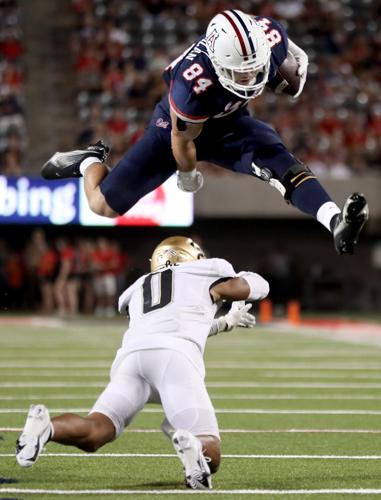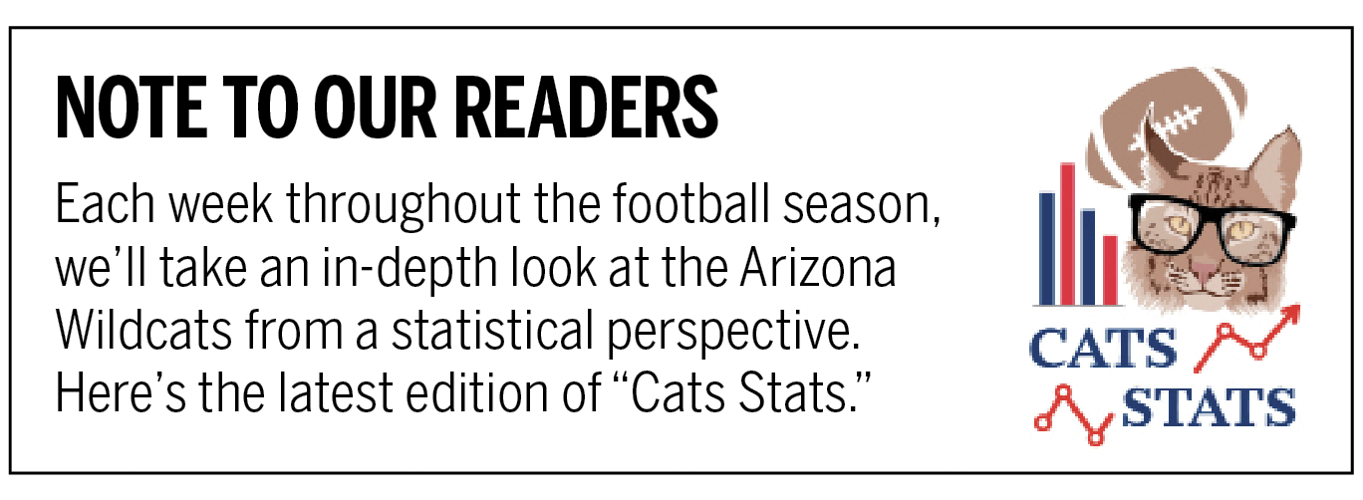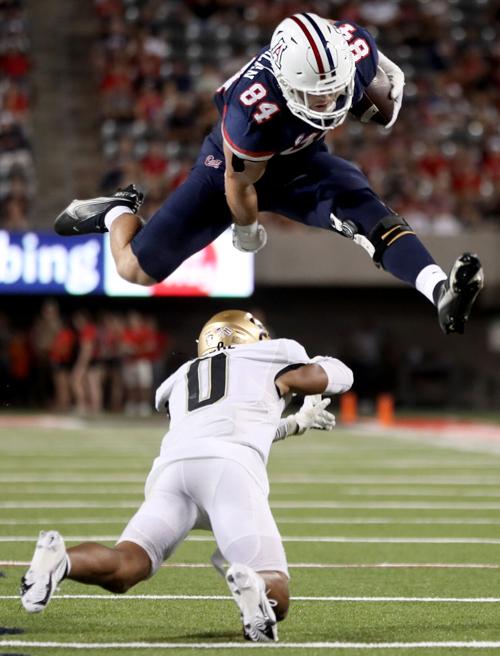Arizona football fans are upset about the Wildcats’ defense, and that’s perfectly understandable. The unit has gone from “We have a few small leaks” to “We just hit an iceberg! Abandon ship!” over the past month.
Arizona fans don’t seem as happy about the UA offense, and that’s also perfectly understandable. Most college-football fans are an angst-ridden lot. The Wildcats have lost four of their past five games. There hasn’t been much to celebrate over the past five seasons.
Jedd Fisch? He’s an eternal optimist. A beacon of positivity.
During recent interactions with the media, Fisch has made a point to note how much Arizona’s offense has improved over last year. He’s not making it up.
In this week’s pre-Utah edition of Cats Stats, we’ll explore the Wildcats’ progress on that side of the ball. We did it by comparing the gains Arizona has made in various rankings and statistics to the rest of the nation (excluding James Madison, which ascended to FBS this year). Spoiler alert: Our research reveals, indisputably, that the Wildcats possess one of the five most-improved offenses in the country.

Total offense
2022: 474.9 yards per game, No. 20 national ranking
2021: 355.9, No. 101
YPG differential: plus-119.0, No. 3
Ranking differential: plus-81, No. 3
Comment: The same two teams rank ahead of Arizona in both categories: Washington and Georgia Southern. Like the Wildcats with Jayden de Laura, the Huskies have thrived with new quarterback Michael Penix Jr. behind center. New coach Kalen DeBoer also brought a new offensive system and philosophy to Seattle. Likewise Clay Helton at Georgia Southern, which previously operated an option attack. The Eagles will appear often in this piece.
Addendum: Arizona has experienced the second-largest jump in average gain per play at 1.73 yards. No. 1 on the list: Kansas at 1.99. Washington is third at 1.67.
Passing offense
2022: 340.1 yards per game, No. 3 national ranking
2021: 226.3, No. 69
YPG differential: plus-113.8, No. 4
Ranking differential: plus-66, No. 5
Comment: This is where the offense has taken the biggest leap. Fisch and his staff added de Laura and receiving weapons Jacob Cowing, Tetairoa McMillan and Tanner McLachlan. Those additions, combined with the emergence of sophomore receiver Dorian Singer, have transformed the UA passing attack. Georgia Southern, Washington and Ohio are ahead of Arizona in both categories. Indiana is also ahead in ranking differential.
Addendum: The Wildcats rank fourth nationally with an improvement of 2.10 yards per pass attempt, trailing North Texas, Kansas and Tennessee. They rank third with a bump of 3.14 yards per completion, trailing Navy and North Texas.
Scoring offense
2022: 32.2 points per game, No. 48 national ranking
2021: 17.2, No. 124
PPG differential: plus-15.0, No. 5
Ranking differential: plus-76, No. 4
Comment: More yards have led to more points. Most of the same teams are the ones ahead of Arizona here: Washington, Georgia Southern and Kansas. TCU, which is 8-0 and No. 7 in the initial College Football Playoff rankings, also ranks ahead of Arizona in points-per-game differential.
Addendum: The Wildcats already have scored more points (260) in eight games than they had in 12 last season (206). The difference is even greater than it appears as Arizona had two non-offensive touchdowns and two safeties in 2021. The Wildcats have yet to score on defense or special teams this year.
Red-zone offense
2022: 56.41% touchdown rate, No. 93 national ranking
2021: 30.77%, No. 130
TD percentage differential: plus-25.64%, No. 4
Ranking differential: plus-37, No. 27
Comment: A No. 93 national ranking is nothing to brag about, but you have to consider the starting point. Arizona was the worst team in the country in red-zone touchdown rate last season, and it wasn’t close. As you can see, only three teams have experienced a bigger jump.
Addendum: The three teams that rank ahead of the Wildcats are all from the Big Ten: Penn State, Wisconsin and Maryland. The fifth-most-improved red-zone team is also from the Big Ten: Purdue. The team that’s regressed the most: San Diego State, Arizona’s Week 1 opponent.
By the numbers
A bunch more numbers illustrate Arizona’s massive, rapid offensive improvement. Here are some of the most notable, plus some other interesting factoids:
* The Wildcats already have 10 more passing touchdowns this season (22) than they had all of last season (12). They have 14 more total touchdowns (32 vs. 18).
* De Laura has more 400-yard passing games (three) than Arizona compiled in the previous seven seasons. The only 400-yard passing game by a Wildcat between 2015 and ’21 was Khalil Tate’s 404-yard output against Colorado on Oct. 5, 2019. That was Arizona’s last victory before its school-record 20-game losing streak.
* De Laura’s stats in 2022 mirror the ones he posted at Washington State a year ago. This season: 2,654 yards, 62.9% completion rate, 22-8 TD-INT ratio. Last season: 2,798 yards, 63.2% completion rate, 23-9 TD-INT ratio. But here’s the catch: He has compiled this year’s numbers in eight games. De Laura appeared in 12 games for the Cougars last season.
* Arizona has more than twice as many 100-yard receiving efforts (seven) as it did last season (three). Cowing and Singer have three apiece. McMillan has one. The Wildcats need two more to match their total from 2018-21.
* Arizona is turning the ball over less this season. The Wildcats are averaging 1.38 turnovers per game. Last year they averaged 1.92.
What a rush
What about rushing, you ask? We didn’t include it in our year-to-year comparison because, at least at first glance, the numbers are about the same. Arizona is averaging 134.8 yards per game, which ranks 85th nationally. Last year the Wildcats averaged 129.6 yards, which ranked 96th.
Arizona actually has improved at running the ball, though. The Wildcats have boosted their average per carry from 3.65 yards to 4.47. When you adjust for sacks, that figure goes from 4.62 yards in 2021 to 5.37 this year.
Despite winning and being competitive in more games this season, Arizona is running about four fewer times per contest. When you can throw the ball as well as the Wildcats have, that’s the preferred mode of travel.






